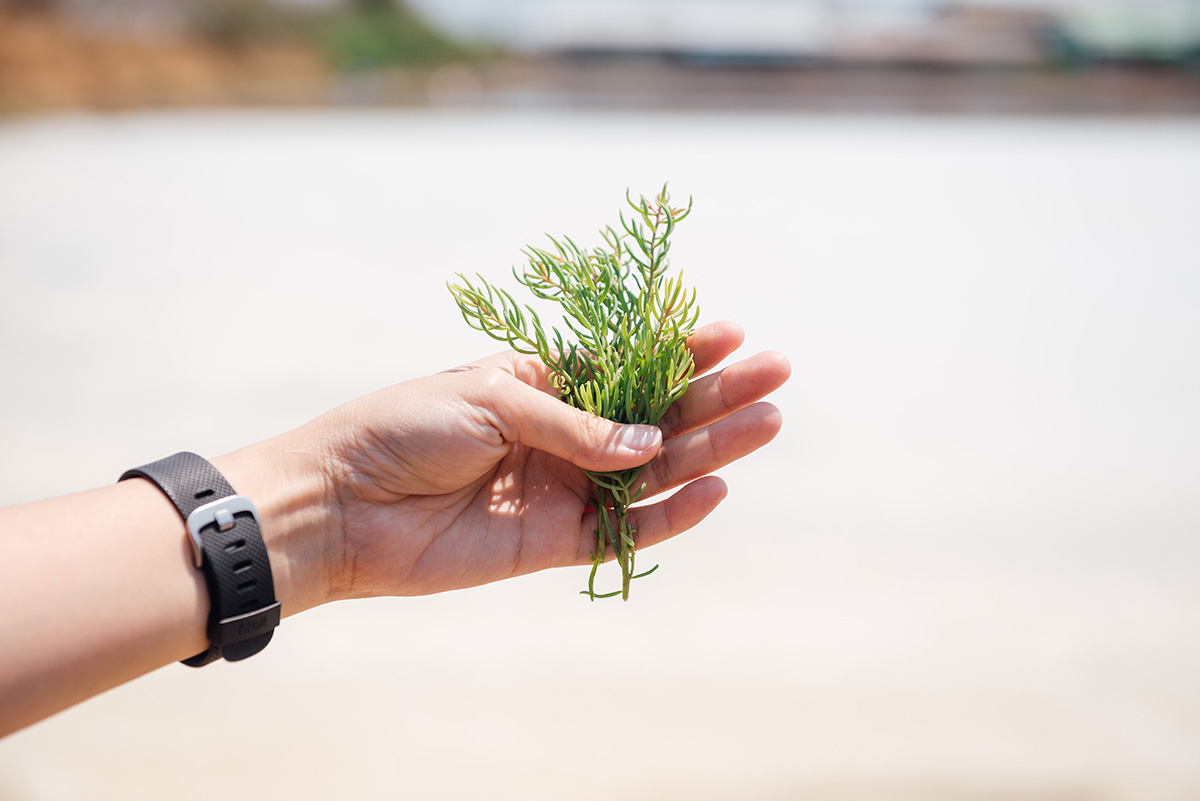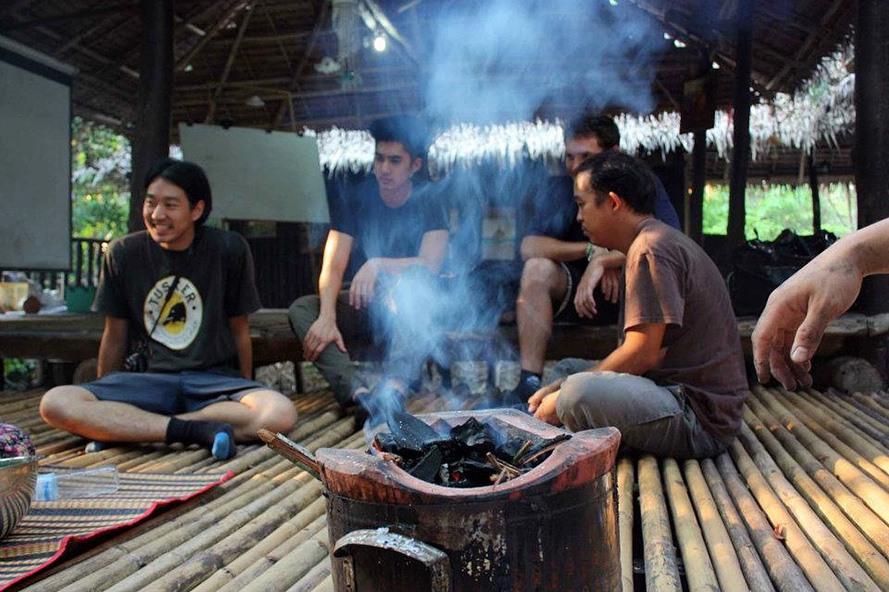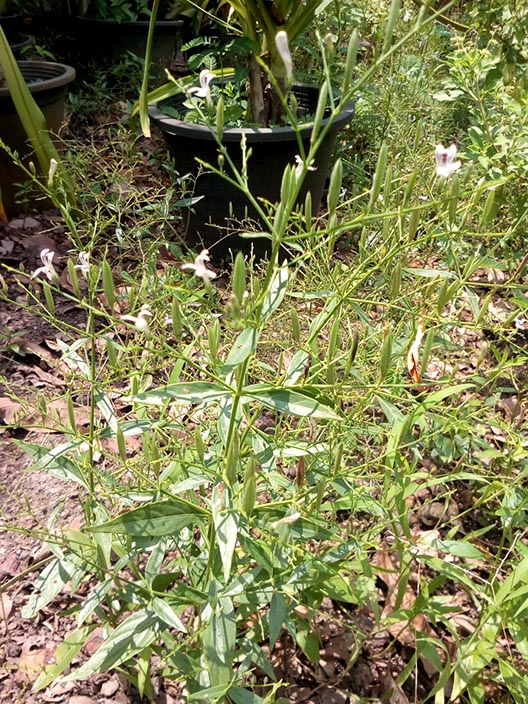
25 Mar Do we have Thai herbal self-reliance options in this time of limited resources?
As is apparent in a number of places already affected by the current coronavirus crisis, our hospitals and medical systems soon may not able to deal with every potential new case. Already governments and hospitals in many parts of the world, including the local medical department in Udon Thani, a friend reports, are advising people not to come to seek medical help for minor symptoms; our medical services need to prioritize services for those who are in greater need.
So both in our self-isolation and in the need to offer available medical services to those in greater need, we may need to rely more and more upon our own capacity to maintain and restore our health. It was not so long ago in Thailand that most every elder in every rural village would have known some basic herbal medicine; a few who knew more, as is even true in my village in Thailand today, would have been respected as traditional doctors. Public services in rural areas were much more limited in the past. Local self-reliance was critical and might be the only option; motor vehicles were rare and roads were rough and travel to urban areas and medical services could take many hours.
For years, with the increasing availability of modern medicine and a distrust of old ways, respect for Thai traditional medicine was lost; however, this attitude has changed. As modern medicine has shown its failings in treating non-communicable diseases, and with the Asian financial crisis of 1997, there was a strong need and motivation to reduce external expenses, including the large budget used to buy pharmaceuticals from abroad, Thai herbal medicine has seen a resurgence both for its unique benefits and in how it supports local farmers and the national economy.
The Chaophraya Abhaibhubejr Hospital, under the guidance of Dr. Supaporn Pitiporn, is arguably the institution that has done the most to both encourage public respect for Thai traditional medicine, and to give it added credibility by pursuing scientific research on the efficacy of different Thai herbs and their best applications. For this reason I visited there to gather any recommendations and advice they are providing for using herbal medicine to help prevent and treat coronavirus. While they are very cautious in their communications in this time of crisis and did not want to provide a public interview, they referred me to information posted on their Facebook page. https://www.facebook.com/abhaiherb.center/
While you may view the information directly in Thai, to share this with the wider English-speaking public, I have translated key points below.
The herb they suggest will be of most value is ‘ฟ้าทะลายโจร” (Fa Talai Jon) Andrographis paniculata. This herb is one of the most popular and available herbs in Thailand; I have learned from my network of accredited traditional doctors is that Fa Talai Jon is both good as an anti-viral and to treat fevers. In traditional medicine recipes, which almost always use a mixture of herbs with complementary benefits, it is a key herb in “Ya Kieow” (green medicine), which in my village is commonly used as a family medicine and can be found at local Mom and Pop stores.
Key advice is available on the abhaiherb Facebook page, shared by Accredited Pharmacist Arsala Chaocharoen:
Six things you should know about Coronavirus and Fa Talai Jon (Andrographis)
1. As COVID-19 is a new virus and new pandemic, while there is not yet a specific cure, the most important measures we can take to are physical means to prevent infection including hand washing, eating hot food, using serving spoons, and wearing face masks when out in our community.
2. COVID-19 manifests from very mild symptoms to life-threatening pulmonary infections. For patients with mild symptoms, it cannot be distinguished from a normal cold/ flu, therefore it is most important to expedite the patient’s rapid recovery to full health.
3. Fa Talai Jon (Andrographis) is on the national registry of medicines of Thailand, where it is indicated for use in treatment of cold/flu symptoms including fever, mucus, and sore throat (having already passed testing for efficacy and safety). Citizens already have the right to choose this herb for treatment of colds/flu.
4. In research with for SARS (another coronavirus of the same family), Fa Talai Jon (Andrographis), was found to help prevent entry of the virus into cells and a patent was registered for this purpose in China. Aside from this in a number of research studies, Fa Talai Jon was also found to have resistance against viruses that attack the respiratory tract such as H1N1, influenza which annually circulates as a pandemic, and H5N1 (bird flu).
5. A comprehensive review of research literature published in 2017 showed that the Andrographolide found in Fa Talai Jon (Andrographis) is a “broad-spectrum anti-viral agent” meaning it has properties that resist viruses by many mechanisms including preventing the virus from entering into cells, reducing the virus’ division rate within the cell, boosting immunity against the virus, and ameliorating lung inflammation from viral infection.
6. In a study to see the efficacy of an extraction from Fa Talai Jon (Andrographis) at preventing colds/flus with students, the herb was found to reduce the rate of cold/ flu infections by 33% over 3 months.
Note- when an herb such as this is registered on the National Registry of Medicines and with the integration of Thai traditional medicine into all public hospitals, citizens can choose the herb if they prefer instead of modern conventional medications.
Thus when we review the scientific evidence both for efficacy and safety, and in considering affordable access to medications and support of the Thai economy, we advise as follows:
1. When experiencing cold/ flu symptoms (if severe immediately seek medical attention) use Fa Talai Jon (Andrographis) 1.5-3 grams, 3-4 times per day. Once in good health patient can stop herb. If no improvement in 3 days, patient should see a doctor.
2. For those at high risk, such as children with allergies (4 years and older), elders with respiratory disease, people who need to work in locations congested with people such as buses, and hospitals, take one (1) capsule of Fa Talai Jon (Andrographis) every other day for 3 months during this epidemic period.
3. Pregnant and breastfeeding women should not take this herb.
More information has been shared in response to a question about preventative use. Accredited Pharmacist Arsala Chaocharoen responds that “1 capsule can be taken 5 days per week (maybe every other day) continuously for 3 months; this should reduce rate of cold/flu infection by 33%”.
“Study with children. Research was done using an extract of 10 mg of Andrographolide 3 times per day for 10 days to treat colds showing no complicated symptoms. With 130 children of 4- 11 years in age, the herb was found to reduce upper respiratory infection symptoms faster than a group that received Echinacea, while also reducing mucus and nasal congestion”
Translation of information posted on https://www.facebook.com/abhaiherb.center/ by Accredited Pharmacist Arsala Chaocharoen
For those people not familiar with Thai medicine, another important detail regarding this herb was explained by Accredited Pharmacist Arsala Chaocharoen: “In terms of taking Fa Talai Jon (Andrographis) for a long period, there is a case of a patient becaming weak after using it for more than one year. This is explained in Thai traditional medicine because this herb is considered “cooling” medicine. When taken in large amounts continuously over many months, the fire element in our bodies may be weakened, and our hands and feet may feel cold, numb and/or weak. We may easily feel cold and weak and it may make the liver work hard as the liver is the critical place for creating heat in the body according to Thai medicine.”
This concept is addressed in the larger scope of Thai medicine, where herbs and foods have cooling and heating properties. Both excessive heat and excessive coolness would be states of imbalance. Taste is also used as a method to indicate medicinal properties. Bitter herbs are generally regarded as anti-viral and anti-fever. Fa Talai Jon is extremely bitter. In at least one language of India, its name means “herb that is more bitter than neem,” another herb famous for its bitterness. Bitter is also indicative of strong cooling properties.
For COVID-19, the only herb that Chaophraya Abhaibhubejr Hospital is suggesting may be of benefit is Fa Talai Jon. However, we may in fact have more need for herbal self-reliance at this time. Since medical services are likely to be over-extended (if not already) and isolation is a key way to reduce infection, we may need to care for ourselves with other minor ailments and injuries. With a minor ailment or injury, it may be a greater risk to seek medical attention, particularly in hospitals where there may be a higher chance of being infected with coronavirus. If we attend to such ailments at home, using our own herbs and knowledge, we can remove the risk of infection through exposure to new people and environments. At the same time, we will be connecting with our ecology and traditional knowledge. If we can rely on a local elder or traditional doctor in our community, this could also mean less travel and unnecessary exposure.
For more details please see the posting at https://www.facebook.com/abhaiherb.center/ and the questions and answers that follow (all in Thai).
We are very fortunate to have Thai medicine with its long tradition and wealth of herbs to treat many different conditions. Chaophraya Abhaibhubejr Hospital has done research on a number of Thai herbs, proving their efficacy and safety, in addition to the many generations of experience and knowledge passed on by our elders and referenced in the books and medica of this tradition.
However for current purposes, developing an understanding of the use of a few basic easily found and used herbs would be the most appropriate. Chaophraya Abhaibhubejr Hospital has published a number of excellent and simple books on how to use Thai herbs for different aspects of our health; however they are all in Thai. While there is a lack of such material in English, one excellent book in print is A Thai Herbal- Traditional Recipes for Health and Harmony by C. Pierce Salguero.

Reviving Thai traditional medicine.
I encourage everyone to take time to learn something about local herbs in this time of need and to connect with Thai traditional doctors and elders who hold this knowledge. For those looking for more guidance in herbal self-reliance, in November 2020, I will help facilitate a 7-day course on Basics of Thai Herbal Medicine (for Family and Community Self-Reliance) at Gaia Ashram in Nong Khai. Prospective dates are 16- 22 November. See https://gaiaschoolasia.com to check for more information and updates.
*Note: The key information shared in this article is public information from the Chaophraya Abhaibhubejr Hospital Facebook page, disseminated for the benefit of citizens and residents of Thailand. Anyone reading this from outside Thailand should follow the advice of their own medical authorities. If interested in herbal self-reliance they may check what herbs these authorities recognize and recommend for similar uses.



